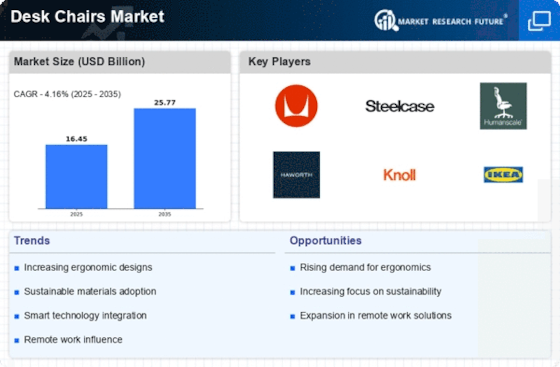Top Industry Leaders in the Desk Chairs Market

The desk chairs market, a segment within the office furniture industry, is characterized by its significance in providing ergonomic solutions for workspaces. As of 2023, key players in this market have strategically positioned themselves to address the increasing demand for comfortable and functional desk chairs in various professional settings.
Key Players:
Herman Miller Inc. (US)
IKEA (Sweden)
Steelcase Inc. (US)
Haworth Inc. (US)
Knoll, Inc. (US)
HNI Corporation (US)
La-Z-Boy Inc. (US)
Vitra (US)
Kimball International (US)
KI (US)
Strategies Adopted:
The desk chairs market employ various strategies to maintain and enhance their market positions. Innovation in ergonomic design is a common approach, with brands introducing features such as adjustable lumbar support, reclining capabilities, and adaptable armrests to promote user comfort and well-being. Customization options, including a variety of upholstery materials and color choices, cater to diverse customer preferences. Brands often engage in collaborations with designers and architects to create signature desk chair collections that resonate with contemporary office aesthetics. Distribution strategies involve partnerships with office furniture dealers, retailers, and e-commerce platforms to ensure a wide market reach.
Market Share Analysis:
The desk chairs industry involves evaluating several factors. Brand reputation and recognition play a crucial role, with well-established names often enjoying higher market shares due to perceived quality and reliability. The ability to offer a comprehensive range of desk chair models, suitable for various work environments and tasks, contributes to market share growth. Pricing competitiveness, warranty offerings, and after-sales services influence customer satisfaction and repeat business. Efficient supply chain management, including manufacturing capabilities and logistics, is pivotal for meeting market demand and ensuring timely product availability.
News & Emerging Companies:
The desk chairs market has witnessed the emergence of new companies focusing on innovative designs, sustainable materials, and technology integration. Emerging companies often leverage digital marketing and direct-to-consumer models to establish their presence in a competitive market. News in this industry typically revolves around the launch of new collections, partnerships with workspace solution providers, and efforts to enhance sustainability through the use of recyclable materials.
Industry Trends:
The desk chairs market often highlights trends in sustainable practices, technology integration, and workplace well-being. Companies are increasingly investing in eco-friendly materials, adopting modular design concepts for recyclability, and reducing the environmental impact of manufacturing processes. Current investment trends reveal a focus on technology, with brands exploring smart features such as sensors for posture monitoring and adjustable settings controlled through mobile apps. Additionally, investments in research and development aim to create desk chairs that align with evolving workplace trends, including the rise of remote work and flexible office layouts.
Competitive Scenario:
The desk chairs market is marked by a combination of established manufacturers with a rich history in office furniture and emerging players disrupting the market with innovative approaches. Established brands often leverage their extensive experience, global reach, and research capabilities to offer a wide range of desk chairs tailored to diverse office requirements. Emerging brands, on the other hand, focus on agility, sustainability, and technology integration to capture the attention of modern workplaces seeking cutting-edge solutions.
E-commerce has played a significant role in reshaping the competitive landscape, allowing brands to reach consumers directly and providing a platform for showcasing diverse desk chair options. Brands that effectively utilize digital marketing, create seamless online shopping experiences, and engage with consumers through online platforms are better positioned to succeed in the evolving market.
Recent Development
The desk chairs market experienced a notable development as Herman Miller, Inc. introduced a new line of smart desk chairs equipped with built-in sensors and connectivity features. The chairs incorporated technology to monitor user posture, providing real-time feedback through a mobile app. This development aligned with the increasing emphasis on workplace well-being and the integration of smart solutions in modern office furniture. Herman Miller's move reflected a commitment to meeting the evolving needs of businesses and employees seeking innovative solutions for the changing dynamics of the contemporary workplace.
Steelcase Inc. made headlines with the launch of a sustainable desk chair collection, featuring chairs made from recycled materials and designed for easy disassembly and recycling at the end of their life cycle. The collection underscored Steelcase's commitment to environmental responsibility and responded to the growing demand for eco-friendly office furniture options. This development showcased the brand's dedication to sustainability in an industry where responsible practices are gaining prominence.
Haworth, Inc. responded to the shift in work dynamics by introducing a series of adaptable desk chairs designed for both office and remote work settings. The chairs featured versatile designs that catered to the flexible nature of modern workspaces. This strategic move highlighted Haworth's focus on providing solutions that align with the changing preferences of businesses and individuals navigating hybrid work environments.
Knoll, Inc. invested in enhancing the customization options for its desk chairs, introducing a digital tool that allowed customers to virtually configure and visualize their chair selections before making a purchase. This technology aimed to provide a personalized and interactive shopping experience, addressing the growing demand for customization in office furniture. Knoll's move reflected an understanding of the importance of digital tools in facilitating decision-making and enhancing customer satisfaction.











